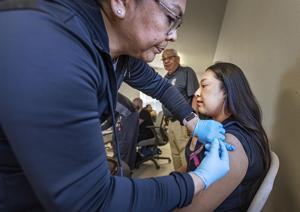Health
New Mexico Seeks Input on $50 Billion Rural Health Initiative

New Mexicans are voicing their priorities for improving rural health care as the state Health Care Authority prepares an application for funding from the recently announced Rural Health Transformation Program. This program, part of a broader $50 billion investment established by the federal budget reconciliation law, aims to enhance health services in rural areas nationwide. The deadline for New Mexico’s application is set for November 5, 2023.
On a recent Wednesday, over 250 health care professionals, including doctors, telehealth developers, paramedics, and hospital executives, gathered to provide input during a public forum. Their feedback highlighted key areas of need, such as expanding behavioral health services, enhancing mobile and telemedicine resources, and improving health care worker recruitment and retention. These priorities align closely with the objectives outlined by New Mexico Medicaid Director Dana Flannery, who expressed enthusiasm about the community’s insights.
The federal budget reconciliation law, signed by President Donald Trump in July, seeks to reduce taxes and discretionary spending through 2034. Among its provisions are cuts to Medicaid and food assistance, raising concerns among lawmakers regarding the potential impact on rural hospitals. The New Mexico Health Care Authority has projected that these Medicaid cuts could result in the closure of six to eight rural hospitals by 2028.
To address these challenges, the Rural Health Transformation Program was created, offering $50 billion over five years for rural health care providers. Funding will be allocated in two parts: $25 billion will be distributed equally among all states, while the remaining $25 billion will depend on each state’s application. New Mexico is aiming to secure part of this second tranche, although some analysts, including the health research organization KFF, indicate that this funding may only cover 37% of the losses anticipated from Medicaid cuts.
During the forum, health care professionals underscored the urgent need for more healthcare workers across various specialties, including nurses, social workers, and physical therapists. While specialists like pediatricians and cardiologists are readily available in urban areas like Albuquerque and Santa Fe, they are often scarce in rural communities.
Dr. Larry Shandler, a representative from the New Mexico Pediatric Society, advocated for increased Medicaid reimbursement rates to attract more doctors and improve access to care. Recent efforts have already led to rate increases for behavioral health, primary care, and maternal and child health services. “We’re seeing a decrease in health services in rural areas, and one of the ways to build that is to build a better telehealth infrastructure,” Shandler noted.
Despite the push for telehealth innovations, some participants raised concerns about the reliability of internet access in rural areas. The Federal Communications Commission reported that approximately 10% of addresses in New Mexico are underserved or unserved by high-speed internet as of 2024.
The forum also highlighted the importance of mobile medical resources, such as paramedicine and mobile integrated health clinics. Faith Applewhite, a paramedic from Santa Fe, emphasized that emergency medical technicians could play a crucial role in delivering health care directly to communities. “We can really be the boots on the ground to deliver that health care,” she stated.
Looking ahead, Flannery reiterated the necessity of securing grant funding to advance these initiatives. “Let’s apply and have a very competitive application so that we can bring home this opportunity,” she said.
The New Mexico Health Care Authority is committed to crafting a robust application that reflects the needs and priorities expressed by health care professionals. As the deadline approaches, the focus remains on ensuring that the state’s rural health care system receives the support it requires to thrive.
-

 Business1 week ago
Business1 week agoIconic Sand Dollar Social Club Listed for $3 Million in Folly Beach
-

 Politics1 week ago
Politics1 week agoAfghan Refugee Detained by ICE After Asylum Hearing in New York
-

 Health1 week ago
Health1 week agoPeptilogics Secures $78 Million to Combat Prosthetic Joint Infections
-

 Science1 week ago
Science1 week agoResearchers Achieve Fastest Genome Sequencing in Under Four Hours
-

 Lifestyle1 week ago
Lifestyle1 week agoJump for Good: San Clemente Pier Fundraiser Allows Legal Leaps
-

 Health1 week ago
Health1 week agoResearcher Uncovers Zika Virus Pathway to Placenta Using Nanotubes
-

 World1 week ago
World1 week agoUS Passport Ranks Drop Out of Top 10 for First Time Ever
-

 Science1 week ago
Science1 week agoMars Observed: Detailed Imaging Reveals Dust Avalanche Dynamics
-

 Entertainment1 week ago
Entertainment1 week agoJennifer Lopez Addresses A-Rod Split in Candid Interview
-

 Business1 week ago
Business1 week agoSan Jose High-Rise Faces Foreclosure Over $182.5 Million Loan
-

 World1 week ago
World1 week agoRegional Pilots’ Salaries Surge to Six Figures in 2025
-

 Top Stories6 days ago
Top Stories6 days agoChicago Symphony Orchestra Dazzles with Berlioz Under Mäkelä









